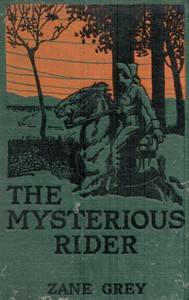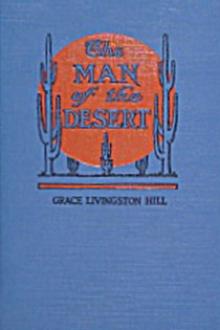The Day of the Beast, Zane Grey [read book txt] 📗

- Author: Zane Grey
Book online «The Day of the Beast, Zane Grey [read book txt] 📗». Author Zane Grey
So once more Lane became a sufferer, burdened by pangs, a wanderer along the naked and lonely shore of grief. His passion and his ideal were at odds. Unless he changed his nature, his reverence for womanhood, he could never realize the happiness that might become his. All that he had sacrificed had indeed been in vain. But he had been true to himself. His pity for Mel was supreme. It was only by the most desperate self-control that he could resist taking her in his arms, confessing his love, swearing with lying lips he had forgotten the wrong done her and asking her to face the future as his loving wife. The thought was maddening. It needed no pity for Mel to strengthen it. He needed love. He needed to fulfill his life.
But Lane did not yield, though he knew that if he continued to live with Mel, in time the sweetness and enchantment of her would be too great for him. This he confessed.
More and more he had to fight his jealousy and the treacherous imagination that would create for him scenes of torment. He cursed himself as base and ignoble. Yet the truth was always there. If Mel had only loved the father of her child—if she had only loved blindly and passionately as a woman—it would have been different. But her sacrifice had not been one of love. It had been one of war. It had the nobility of woman's sacrifice to the race. But as an individual she had perished.
CHAPTER XXIIISummer waned. The long hot days dragged by. The fading rushes along the river drooped wearily over their dry beds. The yellowing leaves of the trees hung dejected; they were mute petitioners for cool breezes and rain. The grasshoppers chirped monotonously, the locusts screeched shrilly, both being products of the long hot summer, and survivors of the heat, inclined to voice their exultation far into the fall season.
September yielded them full sway, and burned away day by day, week by week, dusty and scorching, without even a promise of rain. October, however, dawned, misty and dark; the clouds crept up reluctantly at first and then, as if to make amends for neglect, trooped black and threatening toward the zenith. Storm followed storm, and at evening, after the violent crashing thunder and vivid lightning and driving torrents of rain had ceased, a soft, steady downpour persisted all night and all the next day.
The drought was broken. A rainy fall season was prophesied. The old danger of the river rising in flood was feared.
After the sear and lifeless color of the fields and forests, what a welcome relief to Daren Lane were the freshened green, the dawning red, the tinging gold! The forest on the hill was soft and warm, and but for the gleams of autumn, would have showed some of the tenderness of spring. Down in the lowlands a sea of color waved under a blue, smoky, melancholy haze.
Lane climbed high that Sunday afternoon and penetrated deep into the woods.
There was rest here. The forest was rich, warm with the scent of pine, of arbor vitae. There was the haunting promise of more brilliant hues. Thoughts swept through Lane's mind. The great striving world was out of sight. Here in the gold-flecked shade, under the murmuring pines and pattering poplars, there was a world full of joy, wise in its teaching, significant of the glory that was fading but which would come again.
Lane loved the low hills, the deep, colorful woods in autumn. There he lost himself. He learned. Silence and solitude taught him. From there he had vision of the horde of men righting down the false impossible trails of the world. He felt the sweetness, the frailty, the dependence, the glory and the doom of women battling with life. He realized the hopeless traits of human nature. Like dead scales his egotism dropped from him. He divined the weaving of chances, the unknown and unnamed, the pondering fates in store. The dominance of pain over all—the wraith of the past—the importunity of a future never to be gained—the insistence of nature, ever-pressing closer its ruthless claims—all these which became intelligible to Lane, could not keep life from looming sweet, hopeful, wonderful, worthy man's best fight.
And sometimes the old haunting voices whispered to him out of the river shadows—deeper, different, strangely more unintelligible than ever before, calling more to his soul.
Next morning Lane got up at the usual hour and went outdoors, but returned almost immediately.
"The river is rising fast. Listen. Hear that roar. There's a regular old Niagara just below."
"I imagined that roar was the wind."
"The water has come up three feet since daylight. I guess I'll go down now and pull in some driftwood."
"Oh, Daren! Don't be so adventurous. When the river is high there's a dangerous rapid below."
"You're right about that. But I won't take any risks. I can easily manage the boat, and I'll be careful."
The following three days it rained incessantly. Outside, on the gravel walks, there was a ceaseless drip, drip, drip.
Friday evening the rain ceased, the murky clouds cleared away and for a few moments a rainbow mingled its changing hues with the ruddy glow of the setting sun. The next day dawned bright and dear.
Lane was indeed grateful for a change. Mel had been unaccountably depressed during those gloomy days. And it worried him that this morning she did not appear her usual self.
"Mel, are you well?" he asked.
"Yes, I am perfectly well," she replied. "I couldn't sleep much last night on account of that roar."
"Don't wonder. This flood will be the greatest ever known in Middleville."
"Yes, and that makes more suffering for the poor."
"There are already many homeless. It's fortunate our cottage is situated on this high bank. Just look! I declare, jostling logs and whirling drifts! There's a pen of some kind with an object upon it."
"It's a pig. Oh! poor piggy!" said Mel, compassionately.
A hundred yards out in the rushing yellow current a small house or shed drifted swiftly down stream. Upon it stood a pig. The animal seemed to be stolidly contemplating the turbid flood as if unaware of its danger.
Here the river was half a mile wide, and full of trees, stumps, fences, bridges, sheds—all kinds of drifts. Just below the cottage the river narrowed between two rocky cliffs and roared madly





Comments (0)